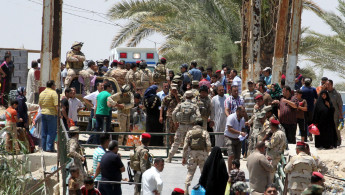Ramadi: a turning point for US military policy?
Ramadi: a turning point for US military policy?
Analysis: Islamic State group's takeover of Anbar capital prompts calls for a US strategy change in Iraq, and warnings not to underestimate the implications of city's fall.
2 min read
The IS takeover has forced thousands to flee Ramadi [AFP]
US statements after the fall of Ramadi to the Islamic State group suggests that Washington views the event as a minor setback.
The Secretary of State, John Kerry, tried to reassure the world that the US would help Iraqi forces retake the city. He said the operation could take weeks, sparking a degree of panic in the US media and Congress.
Some analysts said the IS takeover overshadowed the US commando operation which killed a senior IS leader in Deir az-Zour, Syria, the day before. Others said it paved the way for IS to advance to Fallujah, 50km to the east.
Thomas Friedman, a foreign policy analyst, told NBC News' Meet the Press that the fall of Ramadi should not be underestimated. It is a town of 500,000 people and the capital of Iraq's largest province by area.
Republican Congressman Ryan Zinke, a former naval commander, said winning Ramadi back would not be easy, especially under the terms of the US air campaign.
He said: "Our policy to work from a distance through the air force, particularly in Iraqi territory, is of no use. When your declared programme only includes air operations, IS will... take shelter in hospitals and schools and entrench themselves in places hard to reach by air strikes."
Popular Mobilisation militias
Muhannad Haimour, a spokesman for the governor of Anbar, said that Iraq's prime minister Haider al-Abadi had decided to send reinforcements to try to take back Ramadi, warning of atrocities being committed by the insurgents in the city.
Tens of thousands of people are reported to have fled and UN staff are warning of a humanitarian disaster.
Abadi in fact agreed to the deployment of the largely Shia Popular Mobilisation militias, despite fears of stirring sectarian reactions in the predominantly Sunni city.
The BBC reported on 19 May that several thousand militiamen were in position at Habbaniya, about 20km east of Ramadi.
The Secretary of State, John Kerry, tried to reassure the world that the US would help Iraqi forces retake the city. He said the operation could take weeks, sparking a degree of panic in the US media and Congress.
Some analysts said the IS takeover overshadowed the US commando operation which killed a senior IS leader in Deir az-Zour, Syria, the day before. Others said it paved the way for IS to advance to Fallujah, 50km to the east.
Thomas Friedman, a foreign policy analyst, told NBC News' Meet the Press that the fall of Ramadi should not be underestimated. It is a town of 500,000 people and the capital of Iraq's largest province by area.
Republican Congressman Ryan Zinke, a former naval commander, said winning Ramadi back would not be easy, especially under the terms of the US air campaign.
He said: "Our policy to work from a distance through the air force, particularly in Iraqi territory, is of no use. When your declared programme only includes air operations, IS will... take shelter in hospitals and schools and entrench themselves in places hard to reach by air strikes."
Popular Mobilisation militias
Muhannad Haimour, a spokesman for the governor of Anbar, said that Iraq's prime minister Haider al-Abadi had decided to send reinforcements to try to take back Ramadi, warning of atrocities being committed by the insurgents in the city.
Tens of thousands of people are reported to have fled and UN staff are warning of a humanitarian disaster.
Abadi in fact agreed to the deployment of the largely Shia Popular Mobilisation militias, despite fears of stirring sectarian reactions in the predominantly Sunni city.
The BBC reported on 19 May that several thousand militiamen were in position at Habbaniya, about 20km east of Ramadi.



